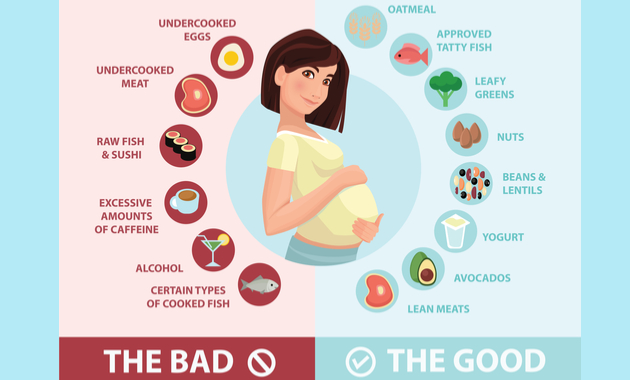
According to the UNICEF India, globally, 800 women die every day of preventable causes related to pregnancy and childbirth; of which around 20% of women are from India. The rate of maternal mortality in India is increasing. Annually, it is estimated that around 44,000 women die due to preventable pregnancy-related causes in India. This could be attributed to the fact that women in India do not exercise properly nor do they watch their diet during pregnancy. So to give insights into how to have a healthy pregnancy, Dr. Payal Chaudhary, Senior Consultant, Fortis Hospital, Delhi shared few diet tips for every pregnant woman.
Foods To Eat And Avoid During Pregnancy
During pregnancy, it is important to ensure that every woman eats a diet rich in required nutrients so as to provide essential nutrients to the growing fetus. Here are a few tips that can help.
1. Load up your intake of nutritious snacks such as yogurt, cheese, dals, boiled sprouts, milk, and egg products, which are not only rich in proteins but also packed with vitamins and minerals. It can also act as an ideal snack option especially for a working woman to keep up with the work and travel. Snacking on popcorn, peanut butter, and crackers, cheese, hard-boiled eggs, and fruit through the day can help to deal with morning sickness and nausea, which is common during pregnancy.
2. Calcium is an important mineral necessary during pregnancy not only for the woman but for the bone growth and development of the fetus. Hence, pregnant women should eat at least four servings of calcium every day to meet the calcium requirements. But do not forget to add foods rich in Vitamin D along with calcium-rich foods to ensure proper absorption of calcium by the body.
Buy best Vitamin and Mineral Supplements at 1mg at an affordable price
3. A pregnant woman should ensure that her iron intake is higher than usual to facilitate the formation of red blood cells and improve blood supply. Moreover, anemia is quite common during pregnancy, hence, vitamin supplements such as Vitamin B12 along with iron supplements should be added to the diet to help reverse the effect of anemia. Hence, iron-rich foods such as poultry, fish, lean red meat, beans, nuts, green leafy vegetables, and seeds should be consumed.
4. Other essential nutrients that are a must during pregnancy is Vitamin B9 (folic acid) and omega-3 fatty acids. You can either eat foods rich in folate and omega-3 fatty acids or take them in the form of supplements, as prescribed by your doctor. These nutrients are important for the growth and development of the mental health of the baby.
5. Lastly, pregnant women should keep themselves well hydrated. This not only helps them to maintain the normal fluid balance in the body but also lower the chances of constipation, which is a common symptom in pregnancy. So to stay hydrated sip on water or fluids such as iced water, lemon juice, barley water or coconut water.
What Every Mom Need Is Here With Us. Grab Now
Foods To Avoid During Pregnancy
1. Foods rich in mercury should be avoided as it can affect the kidneys, immune system and nervous system of the fetus. Fishes such as shark, swordfish, mackerel, and tilefish contain high levels of mercury and should not be consumed.
2. Unprocessed meat can cause several infections which can leave the mother weak and dehydrated. It can also cause bacteria and viruses to enter the body which could lead to further health complications.
3. Caffeine is absorbed quickly into the placenta and fetus. The placenta does not have the key enzyme needed to metabolize caffeine. This causes it to build up in the body and lead to toxicity. Hence, avoid excessive intake of caffeinated and aerated drinks.
4. Raw vegetables, fruits, sprouts, and unpasteurized milk are also a strict no-no during pregnancy. This is because raw vegetables, fruits, and milk can act as the medium for entry of bacteria into the body. This, in turn, can affect the overall growth and health of the fetus, leading to complications.
**Consult India’s best doctors here**
In addition to this, every pregnant woman should practice breathing exercises twice a day to maintain blood pressure. If not exercising, yoga or stretching, then at least a brisk walk is a must. Go for monthly appointments (initially till 7months & thereafter 2 weekly till 8 and half months) to make sure that the pregnancy is progressing smoothly. Stress management should be practiced. Lastly, do consult your gynecologist if you experience any discomfort or pain in the abdomen and not ignore it.
(The article was reviewed by Dr. Lalit Kanodia, General Physician)
Recommended Reads:
Tips To Handle Constipation During Pregnancy
Medical Tests That Are A Must During Pregnancy